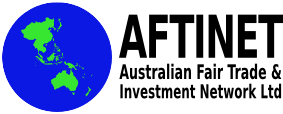NGOs warn against corporate influence on trade talks

Radio Australia | 28 February 2012
NGOs warn against corporate influence on trade talks
The 11th round of negotiations on the Trans-Pacific Partnership or TPP begins in Melbourne, on Thursday.
Nine countries, including the US, Australia and New Zealand and smaller countries like Malaysia, Brunei and Vietnam, are trying to hammer out a trade blue print.
In the past, the talks have stalled over US demands on greater patent and intellectual property rights.
Civil society groups are warning against allowing corporate influence, to drive the talks... with outcomes that may disadvantage the poor and vulnerable in those nations.
Presenter: Sen Lam
Speaker: Dr Patricia Ranald, convenor, Australian Fair Trade and Investment Network, AFTINET
RANALD: The pharmaceutical industry in the US has made submissions to the TPP process in which it states that it wants to extend intellectual property rights for medicines, which would make medicine more expensive for longer. There has been a leaked document of the US trade representative proposals, which reflect what the pharmaceutical companies are asking for. So there is incontrovertible evidence, and they are quite open about what they’re asking for. Last Friday, they actually co-sponsored with Phillip Morris, the tobacco company and some other large companies, a large lobbying party in Washington DC, where they invited the ambassadors from all the TPP negotiating countries. There is plenty of evidence of corporate influence in these negotiations.
LAM: And as I understand it, the US demands for greater patents including medicines and intellectual property rights, they caused the talks to be deadlocked last year?
RANALD: Well, they certainly caused a big delay because those proposals were only tabled late last year, partly in September and then, the rest of them abit later, and most countries have taken about three months just to examine the proposals, and also to demand justification as to why they should agree to proposals which are essentially in the interest of a big export industry of the US but would make access to medicines very difficult, especially in developing countries.
LAM: And can you explain to us how poor or developing countries might be disadvantaged by greater intellectual property rights protection?
RANALD: Well at the moment, intellectual property rights are protected for twenty years, and that means that a pharmaceutical company which has a patent on a medicine can charge the price that it wishes to pay, for twenty years. Now, under the world trade organisation arrangements which were reached more than a decade ago, developing countries have the right to be exempted from these monopoly prices, for medicines that are badly needed for epidemics or chronic diseases like AIDS or malaria. One of the results of the demands that the US trade negotiators are making, would be to undermine these arrangements. Now that would mean that developing countries simply could not afford the new treatments for AIDS or malaria. They rely on getting access to cheaper generic drugs.
LAM: So are NGOs such yourself, suggesting that the larger nations like the US, like Australia, be mindful of a moral obligation, as they enter these talks?
RANALD: That’s right, and it’s more than a moral obligation because in the Asia Pacific, our biggest trading partners are actually some of the ASEAN countries, countries like China, which all rely on having access to generic medicine. It’s not only our moral obligation and our obligation through the WTO arrangement, but it’s also a sensible trade policy to have good relationships with those countries. We do have trade agreements with those countries and we have never made the kinds of demands about intellectual properties that the US is making in this agreement.
LAM: And you’re asking for the text of the agreement to be released for public debate, before the TPPA is signed. Is that realistic? Has there been a precendent?
RANALD: Well, we believe it’s becoming realistic, because there is so much concern about the fact that what is being negotiated in these trade agreements is not just about tariffs or taxes on imports, but it is about things like the cost of medicines, which are social policies in Australia. We have a policy about affordable medicines throught the Pharmaceutical Benefits Scheme, which relies on having a proper intellectual property regime, not one that’s being demanded in these negotiations. It’s even more important that we don’t get a situation where cabinet simply signs the document and then it’s released for public and parliamentary debate. We want the text of the agreement to be released, before it is signed by cabinet. Otherwise, it is very difficult to change.
LAM: And where Australia’s Pacific neighbours are concerned, the island countries, is there a danger that the TPP outcome might also influence Australia’s dealings in these Pacific island trade talks, the so-called PACER PLUS negotiations?
RANALD: Well, we hope not, but the problem with the TPP is that it is being trumpeted as the great standard agreement for the 21st century in the Asia Pacific. Now, our argument would be that if there is to be such agreement, it should have good standards and standards which respect the right of government to regulate in areas like health, medicines, the environment and so on. So, we certainly would be worried, if some of these demands from the US were enshrined in the TPP, there would be a danger then that they would then be seen as a precedent for other agreements. And of course, those sorts of precedents would be even more damaging in very small, vulnerable Pacific island economies.





